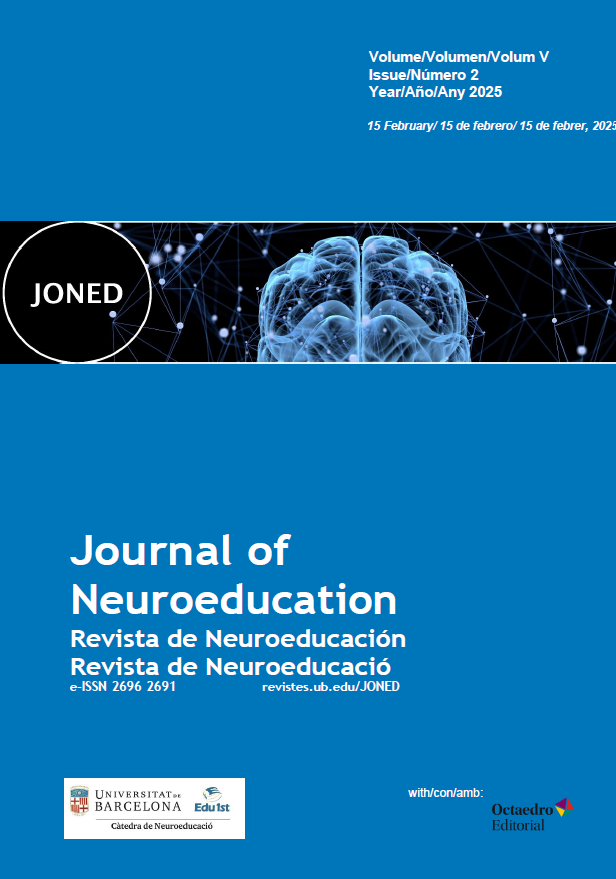Perspectives Of Brain Research (Educational Neuroscience) on the Design and Implementation of Teaching Strategies in Educational Technology
DOI:
https://doi.org/10.1344/joned.v5i2.47695Paraules clau:
neurociències educatives, estratègies d’ensenyament, EdTechResum
La integració de la neurociència educativa i la tecnologia educativa propícia la generació de noves perspectives per a optimitzar la comprensió i l’eficiència dels mètodes pedagògics. Mitjançant l’anàlisi del compromís cerebral amb diverses tecnologies educatives, els educadors poden formular estratègies d’instrucció més eficaces, adaptades a les necessitats específiques dels estudiants. Aquesta metodologia té el potencial de propiciar millores significatives en l’acompliment acadèmic i proporcionar experiències d’aprenentatge diverses i completes. Aquest estudi examina l’impacte dels descobriments de la neurociència educativa en la formulació i posada en pràctica d’estratègies pedagògiques en el context de la tecnologia educativa. Es du a terme una anàlisi de la integració de la tecnologia educativa amb principis de neurociència educativa i es realitza un contrast entre les teories d’aprenentatge tradicionals i les fonamentades en la neurociència. Presenta proves empíriques que corroboren l’optimització dels resultats d’aprenentatge mitjançant metodologies pedagògiques fonamentades en la neurociència, igual que els reptes i restriccions associats amb la implementació de la neurociència educativa en l’àmbit tecnològic educatiu.
Referències
Gkintoni, E., Dimakos, I., Halkiopoulos, C., & Antonopoulou, H. (2023). Contributions of neuroscience to educational praxis: A systematic review. Emerging Science Journal, 7, 146–158.
Tan, Y., & Amiel, J. (2019). Teachers learning to apply neuroscience to classroom instruction: Case of professional development in British Columbia. Professional Development in Education, 48(1), 70–87. https://doi.org/10.1080/19415257.2019.1689522
Bhargava, A., & Ramadas, V. (2022). Implications of neuroscience/neuroeducation in the field of education to enhance the learning outcomes of the students. Journal of Positive School Psychology, 6(6), 6502–6510.
Cearon, I., & Feltes, H. (2020). Neuroscience role in the foreign language teaching and learning. Ciência & Cognição, 25(1), 43–60.
Rosa-Salva, O., Mayer, U., Versace, E., Hébert, M., Lemaire, B. S., & Vallortigara, G. (2021). Sensitive periods for social development: Interactions between predisposed and learned mechanisms. Cognition, 213, 104552.
Nykyporets, S., Melnyk, O., Hadaichuk, N., Derun, V., & Chopliak, V. (2023). Neuropedagogical approach enhancing foreign language acquisition in non-linguistic higher education institutions. Актуальні питання у сучасній науці, 5, 341–355.
Fragkaki, M., Mystakidis, S., & Dimitropoulos, K. (2022). Higher education faculty perceptions and needs on neuroeducation in teaching and learning. Education Sciences, 12(10), 707.
Millei, Z., & Petersen, E. (2022). Psychology, psychiatry and neuroscience in education.
Marshall, L., & Bolt-Lee, C. (2022). A neuroeducation and cognitive learning-based strategy to develop active learning pedagogies for accounting education. Accounting Education Journal, 32.
Dubinsky, J. M., Roehrig, G., & Varma, S. (2013). Infusing neuroscience into teacher professional development. Educational Researcher, 42(6), 317–329. https://doi.org/10.3102/0013189X13499403
Britto, P. R., Yoshikawa, H., & Boller, K. (2011). Quality of early childhood development programs and policies in global contexts: Rationale for investment, conceptual framework and implications for equity. Social Policy Report, 25(2), 1–31.
Tominey, S. L., & McClelland, M. M. (2011). Red light, purple light: Findings from a randomized trial using circle time games to improve behavioral self-regulation in preschool. Early Education and Development, 22(3), 489–519. https://doi.org/10.1080/10409289.2011.574258
Diamond, A., & Lee, K. (2011). Interventions shown to aid executive function development in children 4 to 12 years old. Science, 333(6045), 959–964. https://doi.org/10.1126/science.1204529
Engle, P. L., Fernald, L. C. H., Alderman, H., Behrman, J., & O’Gara, C. (2011). Strategies for reducing inequalities and improving developmental outcomes for young children in low-income and middle-income countries. The Lancet, 378(9799), 1339–1353. https://doi.org/10.1016/S0140-6736(11)60889-1
Aboud, F. E., & Yousafzai, A. K. (2015). Global health and development in early childhood. Annual Review of Psychology, 66, 433–457. https://doi.org/10.1146/annurev-psych-010814-015128
Cowan, N. (2014). Working memory underpins cognitive development, learning, and education. Educational Psychology Review, 26(2), 197–223. https://doi.org/10.1007/s10648-013-9246-y
Sánchez-Sordo, J. M., & Teodoro-Vite, S. (2024). bRAin: Augmented reality brain model for teaching memory disorders to psychology students. Journal of Neuroeducation, 5(1). https://doi.org/10.1344/joned.v5i1.45812
Halkiopoulos, C., & Gkintoni, E. (2024). Leveraging AI in E-Learning: Personalized learning and adaptive assessment through cognitive neuropsychology. A systematic analysis. Electronics, 13(18), 3762. https://doi.org/10.3390/electronics13183762
Hattie, J., & Yates, G. (2014). Visible learning and the science of how we learn. Routledge.
Tyng, C. M., Amin, H. U., Saad, M. N. M., & Malik, A. S. (2017). The influences of emotion on learning and memory. Frontiers in Psychology, 8, 1454. https://doi.org/10.3389/fpsyg.2017.01454
Munakata, Y., Casey, B. J., & Diamond, A. (2004). Developmental cognitive neuroscience: Progress and potential. Trends in Cognitive Sciences, 8(3), 122–128. https://doi.org/10.1016/j.tics.2004.01.005
Kübler, A., & Zander, T. O. (2021). Brain-computer interfaces for neuroadaptive learning. Frontiers in Human Neuroscience, 15, 666642. https://doi.org/10.3389/fnhum.2021.666642
Holmes, W., Bialik, M., & Fadel, C. (2019). Artificial intelligence in education: Promises and implications for teaching and learning. Center for Curriculum Redesign.
Luckin, R., Holmes, W., Griffiths, M., & Forcier, L. B. (2016). Intelligence unleashed: An argument for AI in education. Pearson Education.
Descàrregues
Publicades
Número
Secció
Llicència
Drets d'autor (c) 2025 sani alkhassawneh, Houria Al Sharif

Aquesta obra està sota una llicència internacional Creative Commons Reconeixement-NoComercial 4.0.
Els autors que publiquen en aquesta revista accepten els següents termes:
a. Els autors conserven els drets d’autor i d’organisme a la revista el dret de la primera publicació
b. Els textos que es publicaran sota una Llicència d'Atribució No Comercial Creative Commons permeten altres activitats del treball, sempre que inclogui un reconeixement de l’autorització del treball, la seva actualització inicial en aquesta revista i els termes de la llicència, i no se'n faci un ús comercial.



